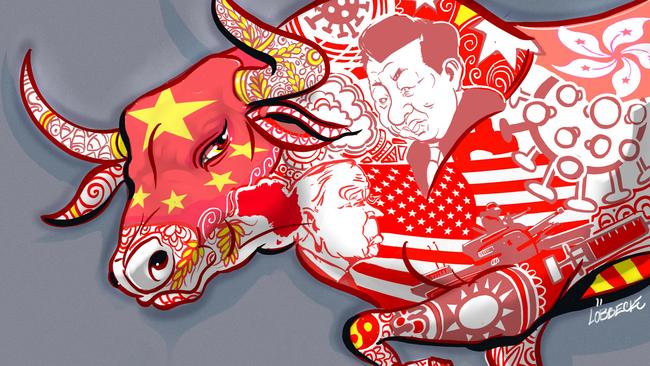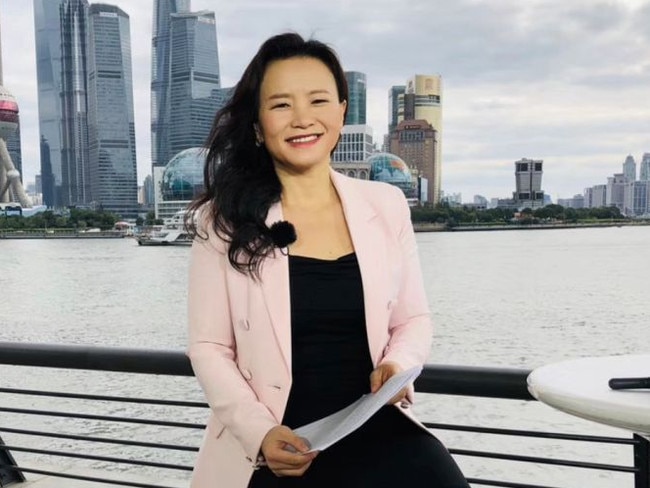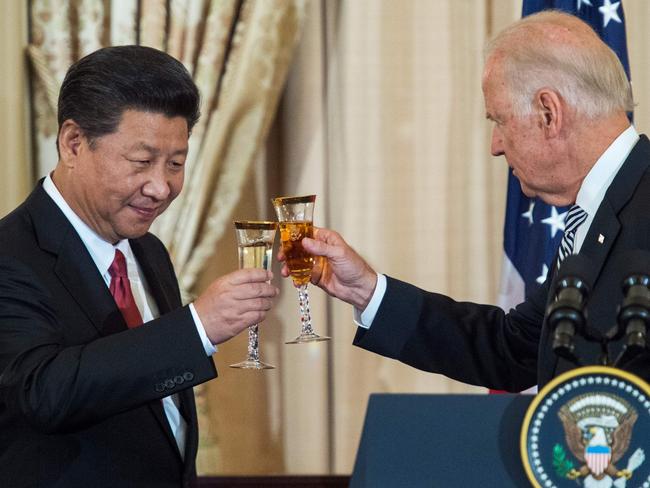Beijing bullying in the Year of the Ox
A Potemkin village tour of stale Covid sites for WHO investigators followed by a fatuous report. Got the picture yet?

— Nineteen Eighty-Four by George Orwell
China’s President, Xi Jinping, is the most ideological leader since Mao Zedong. This week, as we slid from the chaotic Year of the Rat to the Year of the hopefully more stable Ox, the strategic competition and political conflict between China and the US, between China and much of the world, became plain in its ideological lineaments.
Take these indicators. The new US President, Joe Biden, as emollient and avuncular a leader as you could imagine, had his first presidential conversation with Xi, an old friend from when they were vice-presidents together.
But in response to the increasingly ideological, nationalist and belligerent drive of Beijing’s policy since Xi became president, Biden displayed a new resolve. Deliberately consulting US allies before he spoke to Xi, Biden taxed his Chinese counterpart on Beijing’s unfair trading practices, its bullying of regional nations, especially US friends and allies such as Australia, its crackdown in Hong Kong and its increasingly aggressive actions towards Taiwan.
The same day, Biden spoke at the Pentagon and said: “We need to meet the growing challenges posed by China to keep the peace and defend our interests in the Indo-Pacific and globally.”
Get the point everybody?
Biden also announced a US Defence Department-wide China taskforce to look at “our strategy and operational concepts, technology and force posture, and so much more”. These are reluctant but deliberate, calculated, determined steps by Washington in response to a pattern of actions by Beijing that has worried leaders around the world.
This week abounded in signs of the times. Beijing banned the BBC World Service from airing in China because of its reports on human rights abuses in Xinjiang.
The World Health Organisation, conducting its investigation more than a year after the COVID-19 outbreak, received a Potemkin village tour of stale sites conducted for it by the Beijing government, and produced a fatuous report that canvassed as a serious possibility the fantastic theory that COVID-19 might have originated outside of China.
This is a classic moment of communist accomplishment, “creating” reality, untethered from mere facts but in accordance with the party line. Nothing, however, was more illustrative than the decision to formally accuse Australian journalist Cheng Lei, after six months’ imprisonment, with “illegally supplying state secrets overseas”.

Cheng was a news anchor and business journalist on Chinese state television who has hardly ever been known to express a political opinion about anything. The idea she was secretly passing confidential information to foreigners is absurd, a classic high-communist, Franz Kafka moment of surrealism. What it indicates is that the Beijing government no longer cares the slightest bit about Western public opinion. There is no longer any need to invent a semi-plausible allegation of financial wrongdoing or to “discover” drugs on someone. Instead the party establishes reality through the exercise of raw power.
Also this week Linda Jakobson of China Matters issued a report predicting that Beijing would use “every means short of war” to coerce Taiwan into accepting, at least in principle, some form of reunification, or tangible process towards reunification. Some version of this view is widely shared by Western intelligence and analytical agencies.
When Xi came to power in 2012 the Australian government agencies tasked with analysing him concluded he would be more nationalist and more ideological than his predecessors. They were right. But it is not really that he has turned around the direction of modern China. He is an expression of the core ideology of the Chinese Communist Party.
You cannot understand the Chinese state without understanding the culture and ideology of communism, admittedly in its distinctive Chinese variant. Western governments, and even commentators, naturally wish to play down the role of ideology in modern statecraft. But there is one critically significant body that does not do this. That is the CCP, which later this year celebrates the 100th anniversary of its founding and which, in terms of holding power, is the most successful political party in the world.
Perhaps its ideology, what it thinks of itself, is worth some attention. Ideology is certainly not everything but you cannot understand the Chinese government without understanding the ideology of Marxist-Leninist-Mao Zedong Thought. To slightly misuse an old saying of Leon Trotsky: you may not be interested in communist ideology but communist ideology is interested in you.
Dennis Richardson, a former head of the Department of Foreign Affairs and Trade and a former Australian ambassador to Washington, tells Inquirer: “China is now far more ideological. The way they’ve handled the COVID-19 matter should make people worry. This is a classic authoritarian power response, which simply tells lies. Within those constraints, it still makes sense that you try to have the most constructive relationship that you can.”
Peter Varghese, another former DFAT head and a former ambassador to India, believes Beijing is likely to test US resolve on Taiwan sooner rather than later, and this has big implications for us: “All the signalling is that Xi wants Taiwan resolved on his watch and fairly soon. If you leave it to time it won’t happen because sentiment in Taiwan is not moving towards reunification.
“The question is whether Xi and his circle come to the view that their policies of picking fights with everybody simultaneously are not in China’s interests.
“The American system is hardened now. The consensus is that the system would need to take a pretty hard line from the beginning. This could require the Americans being willing to contemplate conflict. At the very least they would want diplomatic support from Japan and Australia. If they (the US) find themselves having to take military actions, not fighting but making some deployments, it’s possible they might want a token allied military presence.”
Varghese also points to the distinctive ideological and political culture at the heart of the Chinese government: “I think what we’re seeing is a Leninist system par excellence. There is enough that Xi has said on the public record that a Marxist view is something he likes to espouse publicly. The system is more and more Leninist and it’s all about party control.”
Western commentators made a profound mistake in 1991, when Mikhail Gorbachev lost power in Moscow and the Soviet Union unravelled, to describe this as the fall of communism. It was the fall only of Soviet communism. Chinese communism looked on aghast and learned all the lessons that have contributed to its own survival.

The term Marxism-Leninism-Mao Zedong Thought is particularly useful in understanding modern China. Marx was the primary theorist of communism, contributing ideas such as the inevitability of history — historical determinism — class conflict, the ideal of a socialist system. Lenin converted Marx’s woolly theories into state power. Lenin was the supreme genius of the dynamics of conflict and the capture and maintenance of power. Communism as it has come to exist has paid less attention to Marxist economic organisation but it has never lost sight of Lenin’s drive to power and the iron conviction that the Communist Party must wield all power. Mao Zedong Thought adapts all this to the distinctive circumstances of China.
It can be useful to see communism as a distinctive world religion. It has its eternal principles in Marxism-Leninism, even involving a dusty metaphysics, and it adapts those principles to China’s national circumstances. Thus Mao Zedong Thought is not exclusively the thoughts of Mao himself but of the Communist Party as it refined these ideas under Mao’s leadership. The Communist Party now has elevated Xi Jinping Thought to an equal place in its pantheon.
This week also furnished two examples of what CCP ideology looks like in practice. The Australian National University’s Centre on China in the World published on its website the testimony of Li Qiaochu, a women’s rights and labour activist who was detained for 100 days for talking to foreign journalists about her partner’s human rights activities. She was detained under “residential surveillance at a designated location”, just as Cheng had been for six months. Her account of this period in detention is chilling. It could come straight out of George Orwell’s Nineteen Eighty-Four.
She was arrested without notice and kept in a small room in the constant company of two or three female guards, who observed her eating, sleeping, showering, going to the toilet. She was subjected to hours and hours of intimidating and insulting interrogation. When not being interrogated she was forced to sit perfectly still for hours at a time. The slightest change in her posture would provoke shouted abuse from the guards. She had to sleep perfectly straight, facing into a glaring light. If she rolled over in her sleep she was instantly woken. She was not allowed to wear underwear and was subject to humiliating comments from male interrogators. When allowed brief periods of walking she had one female guard directly in front of her and one directly behind. Any slight improvement, only having to sit perfectly still for two hours instead of four, say, depended on how thoroughly she co-operated with her interrogation, admitted her guilt and acknowledged the authority, the truthfulness, of the party.
This treatment was certainly cruel, but it was not only, or in a sense primarily, about cruelty. As Li recounts, it succeeded in converting her, for a time, into a true believer in the CCP. She became grateful to the guards when they allowed her slight relaxations. She came to think of being allowed to roll over in bed as a privilege graciously extended to her.
A cruder and more violent example of communist power was broadcast on the BBC, which is one reason it was banned in China.
It ran programs featuring interviews with Uighur women who had escaped into Kazakhstan and the West, who recounted being systematically gang-raped by masked guards in the Uighur detention centres in Xinjiang. The Chinese government denies these accusations absolutely.
One of the most important interpreters of modern Chinese culture Australia has produced is Sinologist Geremie Barme. He tells Inquirer that the CCP’s essential aims have not changed in its 100 years. It is notionally committed to the betterment of mankind through the establishment of a dictatorship of the proletariat and a subsequent socialist society. Central to realising this vision is the Leninist insistence on the absolute superiority of the party.
This puts the famous cautionary advice of reformist leader Deng Xiaoping, “Hide your capacities and bide your time”, into a different light. The liberalisation noises of previous Chinese leaders can be seen as a pragmatic, temporary accommodation of Western sensibilities mainly to buy time. Says Barme: “The party is a profoundly ideological, hierarchical structure. When they decided to get rid of Mao in the 70s, Mao Zedong Thought served as a crystallisation of party policy. The party, by reaffirming authoritarianism, is crippling the society’s ability to mature and grow.”
Barme stresses the continuity of CCP thinking: “Xi says today we will never forget our original intent. The party has an incredibly integrated and elaborate theory. Xi integrated this theory in the context of China’s global position and role. The media cannot be oppositional, the party must control everything. It’s terrifying stuff and unbelievably boring. They want to eliminate humanity from the human race. It’s a war against all human spirituality.”
One of the biggest changes of today, Barme says, is that “they seem so assured of power that they don’t need to make practical concessions any more”. This is difficult for Western policymakers and intellectuals to understand, Barme says, because to enter into the mind of the Chinese Communist Party “demands a different way of ordering reality”.
Whichever way you cut it, reality in the Year of the Ox looks just as tough as in the Year of the Rat.


The Party told you to reject the evidence of your eyes and ears. It was their final, most essential, command. His heart sank as he thought of the enormous power arrayed against him … With the feeling that he was setting forth an important axiom, he wrote: Freedom is the freedom to say that two plus two make four. If that is granted, all else follows.